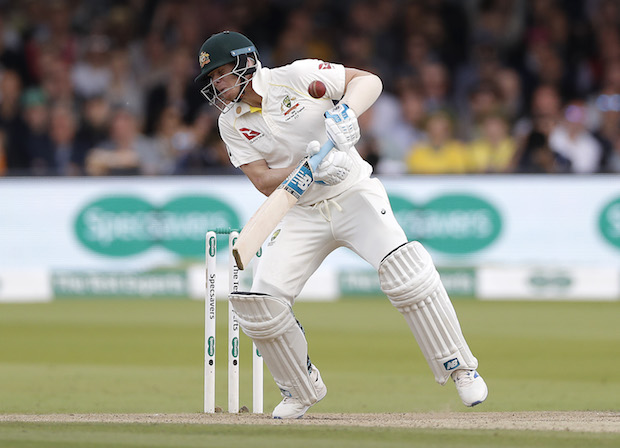Nothing in cricket is quite as visceral, even quite as primeval, as the confrontation between a batsmen of the highest class and a bowler of the greatest velocity. Sometimes, as with a Colin Croft or a Charlie Griffith or Lillee and Thomson at their snarling fastest, this can be streaked with nastiness. Broken bones and shattered confidence is part of the point; the goal of the matter. But sometimes it is just different; somehow purer. Mike Atherton’s famous confrontation with Alan Donald falls into that category.
And so to Saturday at Lord’s, always the highlight of the English summer, but rarely, even in the long history of the famous old ground, quite as compelling as this. Sporting Australian green, Steve Smith, the world’s greatest current batsman – with apologies to Virat Kohli – and plausibly the second-finest Australian batsman of all time. There’s a conversation to be had about that, at least. Then, in the blue corner and on test debut, Jofra Archer, late of Barbados and now of Sussex. Archer, one of England’s world cup heroes, is a disarming bowler. He looks as though he should be a line and length merchant; that short run, not much more than a trot, to the wicket, the lack of any great leap in the bowling stride, the closeness to the stumps. All these point to a nagging bowler, not an express. Then the ball arrives, more effortlessly quickly than you think possible. On the rapid side of brisk, if you will.
And that makes all the difference. To the layman there’s little difference between 88 and 92mph but to the pro, even the very best of them, it shifts batting from calculation to instinct. It is a question of nerve and of nerves too. As the great Yorkshire and England batsman Maurice Leyland once said of bouncers, “Nobody likes ‘em, but some of us don’t let on”.
Archer’s prize-fight with Smith yesterday will live long in the memory. It was an announcement and a coming out; a harbinger of battles future. As such it may just have laid down a marker for the rest of this series. That depends on England batting well on Sunday morning, of course, ensuring they save this game first and only then, if at all, daring to contemplate the possibility of dismissing Australia inside 50 overs.
In the absence of the injured Jimmy Anderson, Archer is already England’s key player in this series. He may not have dismissed Smith yesterday but he deserved a share in the Australian champion’s eventual downfall nonetheless. For the first time in this Ashes series – or the last one, come to think of it – Smith looked something less than a demi-god.
Not that he was scared or flinching from the fight, far from it. Merely that he was in one. He knows it and Archer knows it and Joe Root knows that Smith knows Archer knows it too. The bumper than felled Smith was a vicious one and the sight of the Australian sprawled on the Lord’s turf was chilling. Even so no blame attaches itself to the bowler in this instance. Smith was hit outside the line of off-stump and if the tangle into which he got himself owed something to the idiosyncrasies of his very particular technique. But pace does that.
It felt like a kind of warning-off too; a statement from Archer that claimed the corridor for himself. Smith may yet take possession of that lane of uncertainty but he does so knowing he will henceforth have to fight for it. Pushing Smith back, forcing him to rethink his own game is the first step towards containment and even, if England are lucky, victory.
I don’t know if Smith should have been permitted to return to the field. Of course he wanted to and doubtless he did pass all the necessary concussion tests. But it felt queasy anyway and you wondered if there should have been someone in that Australian dressing room counselling caution and restraint.
Test cricket is a tough school, though, and this being so if I’d been Joe Root I’d have brought Archer back into the attack immediately, tiredness be damned. Perhaps, though, it was better that he did not, better that Smith – frazzled or not – fell to Chris Woakes, that whole-hearted, wholly-admirable cricketer, rather than have the opportunity to recover some composure against Archer. For if Smith had done that and if he had mastered Archer yesterday afternoon the psychological advantage you feel or sense or perhaps just hope the Englishman has established might have melted away in the blink of an over or two.
But what a batsman Smith is. His technique looks as though it should never prosper even if, as is so often the case with the seemingly unorthodox, it is at heart more orthodox than it seems. Beyond or away from all the twitching and fidgeting, the box adjusting and glove-tugging, the bouncing towards square leg between deliveries and all the rest of it, lies this simple, classical, reality: Steve Smith plays in line. All the rest is ephemeral. Granted, he can only thrive thanks to an uncanny gift of hand-eye coordination that saves him from the ever-present threat of LBW. Nonetheless, he’s a little less freakish than he looks even if he is only intermittently beautiful.
What courage, however. If it were not for Smith England would fancy their chances of regaining the Ashes in Leeds. Already it has sometimes felt as though Australia are playing with an extra man. That’s Bradmanesque too.
The wrongs and further wrongs of Sandpapergate now belong in the far distant past. Smith’s crime was one of degree and premeditation more than it was one of kind. Cricketers from all countries have spent more than 140 years trying to extract every last drop of advantage from the condition of the ball. Sometimes this has flagrantly breached both the letter and the spirit of the law, sometimes only the latter. Smith’s offence was plainly in the former category but he has paid and served his time. To boo him now, especially when he has treated us to three successive masterpieces, seems both churlish and somehow contrary to the spirit of the game. But then while a conservative on most cricketing matters, I’m a liberal on crime and punishment.
Cricket, as Mike Atherton often reminds us, is at its best when the ball enjoys a slight supremacy over the bat. That has been evident already in each of these two gripping test matches; the prospect of three more such encounters is delicious.
And in Jofra Archer, England look to have something precious; the kind of jewel that comes along only rarely. He makes it look so easy, too, and that only adds to the magic and the mystery of it all.
Got something to add? Join the discussion and comment below.
Get 10 issues for just $10
Subscribe to The Spectator Australia today for the next 10 magazine issues, plus full online access, for just $10.





















Comments
Don't miss out
Join the conversation with other Spectator Australia readers. Subscribe to leave a comment.
SUBSCRIBEAlready a subscriber? Log in